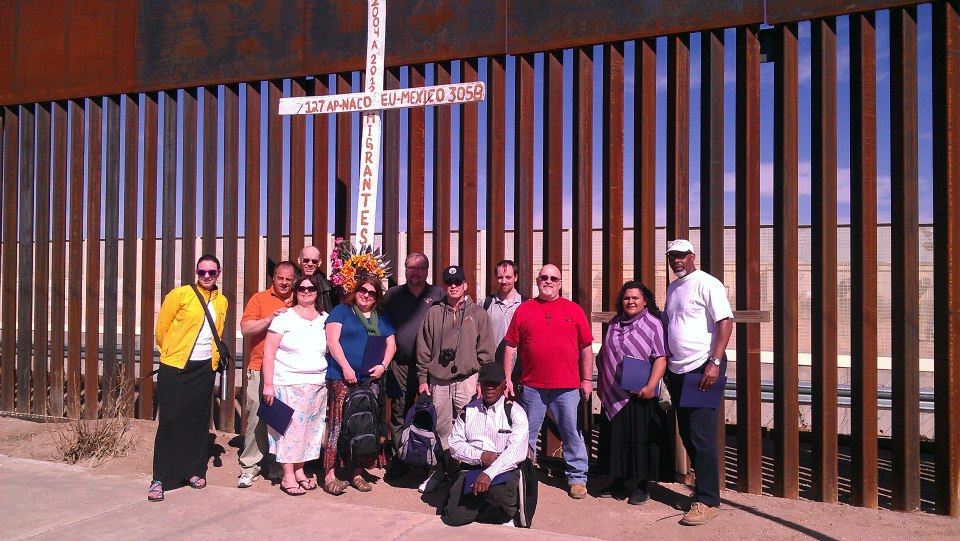When you get home from a mission trip, people always ask, “What did you do?” A wise man once told me that hanging drywall is never the purpose of a short-term mission trip. The purpose is to immerse yourselves in a different cultural context, meet new people, learn about their lives, understand their context, and look for the ways that God is working in that corner of the world. You’re there to build relationships with people in that community and to strengthen the bonds within your own group; if you happen to hang some drywall while you’re there, that’s great, too. I would also add that seeing and participating in someone else’s reality helps to see your own corner of the world a little bit differently—ideally, you get a fresh perspective on your life and what God is calling you to do in your own community. We did not hang drywall during our trip to the Mexico border.
We were a group of eleven pilgrims, many of whom were not from the PTS community. We were from different contexts and different world views—urban vs. rural, liberal vs. conservative. The trip was co-lead by the Rev. John Welch, Dean of Students at PTS and PTS alum Rev. Sarah Ott (class of 2010), the pastor of the First United Presbyterian Church of DuBois, PA. The group included three current students (James Lee, Alan Olson, and Bradley Rito), one other PTS alum (Ken Love), and five people from DuBois (John Hoover, Mary Morrow, Marty Neal, and Dave & Karen Rupprecht). We went to the city of Agua Prieta, Mexico.
Agua Prieta is a city of 120,000, located across the border from Douglas, AZ. While we were there, we coordinated with Frontera de Cristo, a mission agency of the PC (USA). We learned about Frontera’s various ministries on both sides of the border. We learned about U.S. immigration policy, and then we saw the human consequences of that unjust policy. We shared tables with migrant workers and we heard their stories. We enjoyed the hospitality of Mexican families. We walked the paths of migrant workers in the Sonora desert and we participated in a prayer vigil for those who lost their lives along the border.
For me, the most powerful event of the entire trip was a meal that we shared with migrant workers at a shelter (run by the Catholic Church) called CAME. We met the migrant workers as equals at the table; we heard their stories. I sat across from three men: Juan, Miguel Angel, and Jorge. Juan appeared to be in his forties. He had worked in California and his family was there. He was going to try to get back to his family. Jorge, 24, had last worked in Sheboygan, WI. He dropped out of school so that he could work and send money home—so his brothers and sisters could continue their education. All three men spoke of the pain of separation from their loved ones. Miguel Angel also dropped out of school and went to work so that his siblings could get an education. His last job was in the kitchen at a Chili’s restaurant in Bensalem, PA. I know where that restaurant is; it can’t be more than five miles from where my mother lives. I may have eaten there. Miguel Angel may have prepared my food. In that instant my world shrunk. Had I just traveled thousands of miles to meet a man who worked where my mother lived?
We were only in Mexico for five days, but still, there are too many stories to tell in one blog post. We saw God at work in many wonderful ways. I could tell you about the good work that’s being done by Café Justo, a fair-trade coffee company that was founded with seed money from Frontera de Cristo. I could tell you about the U.S. Border Patrol officer we ate lunch with, and how there are kind and decent people charged with enforcing this unjust policy in the United States. I could tell you all about the prayer vigil in Douglas, AZ, where we recognized the names of migrants who lost their lives, remembering those who might otherwise be forgotten. I could tell you so much, but there isn’t enough space.
I will tell you that the two groups on our trip became one while we were in Mexico. We all came to see that the fence was a symbol for an unjust immigration policy and that there is an urgent need to change that policy. The more time I spent looking at that fence, the more I became aware of the walls within my own heart. We are called by Christ to love one another, to practice agape love for all. None of us will ever live up to this completely, but if we are to be faithful to Christ’s call, we must begin to tear down the walls in our hearts. For me, this process began in earnest at a table, in Agua Prieta, while sharing a meal with Jaun, Miguel Angel, and Jorge.
By Alan Olson, MDiv student at Pittsburgh Theological Seminary
Learn more about WMI and the work they do by liking their page on Facebook or going to their website: http://worldmissioninitiative.org/

